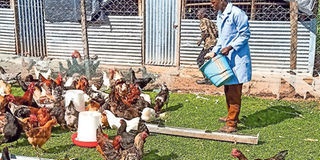How I cushion my poultry venture from virus effects

Rolex Wasonga feeds chicken in his farm in Migori County. He started poultry farming in May 2019 with just 30 indigenous birds that he bought from his neighbours. PHOTO | LEOPOLD OBI | NATION MEDIA GROUP
What you need to know:
- Wasonga, 30, started poultry farming in May 2019 with just 30 indigenous birds that he bought from his neighbours.
- It is from the chama earnings that Wasonga expanded his chicken business, buying a batch of 430 two-week-old Kuroiler birds.
- A radio programme on poultry making feeds opened his eyes and he enrolled for a short-course on poultry production at the nearby Elego Poultry farm.
- He currently makes his own feeds using maize germ, fish meal, wheat bran and rice straw. This has helped him cut costs in half.
Dressed in a navy-blue overcoat, brown trousers and matching gumboots, Rolex Otieno Wasonga walks with a bucket full of poultry feeds from one feeder to another, refilling them.
His birds, 1,600 of them, flap their wings with excitement as they receive their first portion of the daily share.
“The coronavirus pandemic has messed up business. Buyers are no longer placing requests,” says Rolex as he holds one of the birds to feel its weight.
Wasonga, 30, started poultry farming in May 2019 with just 30 indigenous birds that he bought from his neighbours.
At the time, the farmer was working at a road construction firm not far from his home in Kwoyo-Kadera village, some 30 kilometres from Awendo in Migori County.
But the work was intermittent, prompting him to start the agribusiness for more income.
“While working at the firm, we formed a chama called Door-to-door Youth Group comprising 12 members. Every month we contributed Sh3,600 and gave it to one person,” explains the farmer.
It is from the chama earnings that Wasonga expanded his chicken business, buying a batch of 430 two-week-old Kuroiler birds.
He, thereafter, fitted the poultry house with a water tank where he stores the water he harvests. He also expanded the coop to host new stock.
But as the flock grew bigger both in size and age, more challenges arose for the Row Poultry Farm proprietor.
“Feeding such a large number of birds isn’t easy, especially as they became older,” he observes.
In a day, a mature bird eats between 70-90 grammes, thus he ended up spending up to Sh9,000 weekly.
A radio programme on poultry making feeds opened his eyes and he enrolled for a short-course on poultry production at the nearby Elego Poultry farm.
“The training helped me a lot on basic poultry management, housing, vaccination and feed formulation,” he says.
STRICT VACCINATION REGIME
He currently makes his own feeds using maize germ, fish meal, wheat bran and rice straw. This has helped him cut costs in half.
“I buy the materials from a miller in Kisumu, fish meal from local fishermen and sunflower from farmers in Migori and Homa Bay counties,” he says, but the Covid-19 crisis and floods have made the materials scarcer and expensive. To cushion himself, Wasonga free-ranges the birds for some hours.
“Normally, I feed the birds on commercial products for the first two months then afterwards I introduce the home-made feeds,” Wasonga, who has set aside the first generation of his birds as a breeding stock, points out.
According to him, using chick mash as a starter makes the birds respond to the feeds much faster. However, as they grow, their feed consumption rate rises remarkably, making commercial feeds unsustainable.
He also grows greens for the birds by soaking several tins of yellow maize for three days in water and then allows them to germinate.
“After three days, I place the sprouting seeds on a heap of soil for them to germinate. In seven days, they develop shoots and leaves, which the chickens feed on,” explains Wasonga, who sells the birds at between Sh800 and Sh1,000 each, with Christmas and Easter holidays being his peak seasons.
He also sells unfertilised eggs at Sh350 a crate, mostly to his neighbours while fertilised ones go for Sh750 a crate. He, however, mainly keeps the eggs for his hatchery.
Besides the coronavirus outbreak, heavy rains being experienced in many parts of the country, especially in western Kenya, have affected the farmer’s chicks due to the cold weather.
Dennis Kigiri, a poultry production expert from Egerton University, says proper poultry management is crucial for the success of a farming venture and entails adherence to a strict vaccination regime and disease prevention.
“Manufacturing own feeds works well when you have a source of high quality feed ingredients, equipment and the animal nutrients requirements," Kagiri says.
****
Get it fast
Challenges in poultry business
- Main challenges include high cost of feed ingredients, with a bag of maize currently going for an average of Sh3,600 locally.
- Quality feeds must have maize, sunflower, wheat pollard and soya as well as amino acids and many other ingredients.
- The high cost of these raw materials is one of the reasons poultry feeds are expensive.





